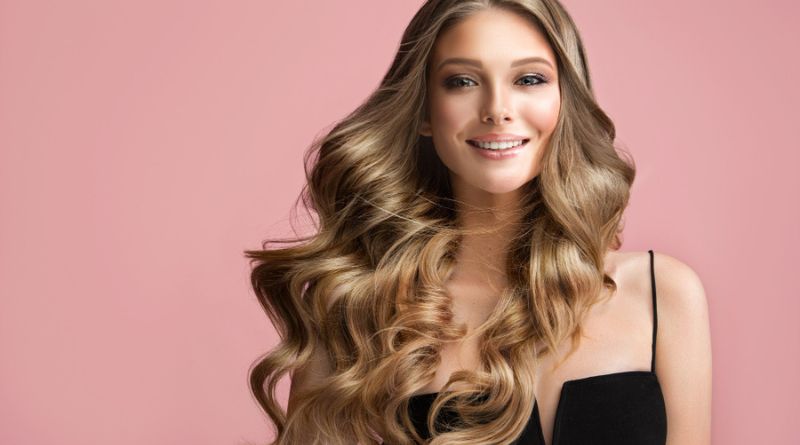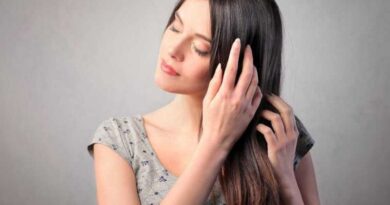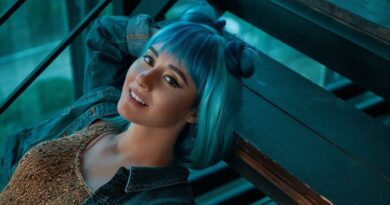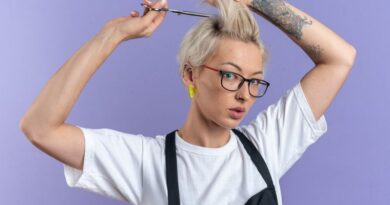Most people do simple hair color in one tone, all over their hair, but various multi-color techniques can give a unique, beautiful look to your hair. The various color techniques are highlights, lowlights, Wet lights, Ombre, Balayage, etc. The most popular among them are Balayage Ombre.
Many people think that Balayage Ombre is the same because they find the look same. But that is not true. Balayage & Ombre are different from each other; they are different in looks, styling method, application technique & other factors.
Today, let’s know about Balayage Ombre & how they are different, breaking the myth that they are both the same.
What is Balayage Hair Technique?
Balayage word is a French word, which means to paint or seep. So it is actually a coloring technique and not a hair color. Actually, it involves how the dye or bleach is applied to your hair.
In Balayage, the hair colorist uses hair dye or bleach on your hair freehandedly or using a brush. The hair color is applied by brush or hands to create a flowing effect. This technique creates natural-looking gradient effects and a classic swept-away color blend.
Usually, this technique is best for blonde or brunette hair color. The color in Balayge is lighter at the roots and gets heavier towards the hair ends.
One can either get full hair Balayage, covering all hair sections, or partial highlights, in which only top layers of hair get covered.
The Balayage looks great on long & medium-length hair. Moreover, it is cost-effective as it does not require frequent touch-ups & the hair at the top are kept darker.
Also Read- 9 Best Over the Counter Hair Color [ Gray, Blonde, and More]
How much time does it take to get Balayage?
The time it takes to get Balayage depends on factors like hair length and desired results. On average, it can take 2 to 4 hours for the entire process. Balayage involves a meticulous hand-painting technique, making it a bit more time-consuming than traditional highlighting methods. The duration may also vary based on the stylist’s expertise and the complexity of the chosen Balayage style. It’s recommended to consult with your stylist for a more accurate estimate tailored to your specific preferences and hair characteristics.
Types of Balayage
Certainly! There are various types of Balayage techniques, each offering a distinct look. Here are some popular types:
- Classic Balayage: Classic Balayage is a timeless and versatile hair coloring technique that involves hand-painting highlights onto the hair for a natural and sun-kissed effect. The highlights are strategically placed to mimic the way the sun naturally lightens the hair, creating a seamless and blended look. This technique provides a softer regrowth line compared to traditional highlights, making it a low-maintenance option. Classic Balayage works well on various hair lengths and textures, offering a customized and effortlessly chic result. It’s a go-to choice for those seeking a subtle and natural-looking enhancement to their hair color.
- Foilyage: Foilyage is a modern and vibrant twist on the traditional Balayage technique. In this method, hand-painted highlights are applied to the hair and then wrapped in foils for enhanced lift and intensified color saturation. This combination of freehand painting and foiling allows for greater control over the color development, resulting in brighter and more pronounced highlights. Foilyage is particularly effective for achieving a sun-kissed and multidimensional look, making it a popular choice for those who desire a bolder and more luminous effect than classic Balayage. The foil wrapping accelerates the coloring process, making Foilyage a versatile option for individuals looking to add depth and dimension to their hair with a touch of contemporary flair.
- Ombre Balayage: Ombre Balayage seamlessly marries the gradual color transition of Ombre with the hand-painted finesse of Balayage. This technique begins with darker roots and gracefully transitions to lighter ends, blending effortlessly for a natural and radiant effect. Ombre Balayage allows for a harmonious interplay of colors, creating a soft and dimensional look. The hand-painted highlights in the Balayage style ensure a seamless gradient, avoiding any harsh lines between the dark and light shades. This fusion of two popular coloring techniques offers a versatile and stylish option, providing a modern twist to the classic Ombre and showcasing the artistry of both Balayage and Ombre in a single transformative hairstyle.
- Sombre (Subtle Ombre): Sombre, short for Subtle Ombre, is a gentle and nuanced take on the classic Ombre technique. In Sombre, the color transition from dark to light is more subdued and gradual, creating a softer contrast. The highlights are delicately applied, often focusing on the mid-lengths to ends, resulting in a subtle and natural-looking effect. Sombre is known for its low-maintenance appeal, as the regrowth is seamless and less noticeable than bolder Ombre styles. This technique is perfect for those seeking a graceful and understated enhancement to their hair color, providing a touch of dimension and radiance without the high contrast typically associated with traditional Ombre styles.
What is the Ombré hair Technique?
Ombré is a French word meaning, ”to shade or shadow.” In this color tone, the hair color on the hair roots is darker, and it gets lighter gradually towards the end. It’s a kind of hair painting technique in which the hair becomes darker at the roots & midshaft and then lighter at the ends.
The Ombre Process– In this technique, paint is applied from the darker roots to the lighter, saturated ends. Hair that has already been colored or highlighted may have roots painted on at the base that matches the hair’s natural color. Your hairstylist should gradually build the color from the mid-shaft to the ends by bringing a picture of your ideal “tip” color.
How Long does it last- Getting it done from a good hair colorist or professional, Ombre, can last up to three months.
When to Choose it? – Opt for ombré if you want to draw attention to your natural hair color or prefer a natural look with bold colors.
Types of Ombre
Certainly! Here are four popular types of Ombre techniques:
- Classic Ombre: The classic Ombre features a seamless transition from darker roots to lighter ends, creating a bold and distinct gradient effect. It’s a timeless style that adds depth and dimension to the hair.
- Reverse Ombre: Reverse Ombre flips the traditional Ombre by starting with lighter roots and gradually transitioning to darker ends. This inversion creates a unique and eye-catching look with a dramatic contrast.
- Colored Ombre: Colored Ombre introduces vibrant or unconventional hues into the transition, allowing for a playful and creative twist. This type of Ombre is popular for those who want to experiment with bold and vivid colors.
- Ashy Ombre: Ashy Ombre incorporates cool-toned, ashy shades for a more muted and sophisticated appearance. This style is characterized by cooler undertones, providing a modern and chic twist to the traditional Ombre look.
Difference Between Balayage & Ombre?
Certainly! Here’s a breakdown of the key differences between Balayage and Ombre:
Balayage:
- Technique: Hand-painted highlights for a natural, sun-kissed look.
- Placement: Highlights are strategically placed at random for a seamless blend.
- Transition: Soft and gradual, creating a natural-looking effect.
- Maintenance: Lower maintenance due to the natural regrowth appearance.
- Versatility: Adaptable to various hair lengths, textures, and colors.
Ombre:
- Technique: Gradual color transition from dark to light, often achieved through color fading.
- Placement: Color transition is typically from mid-length to ends, creating a noticeable contrast.
- Transition: Defined and intentional, with a clear distinction between the dark and light sections.
- Maintenance: May require more frequent touch-ups to maintain the distinct gradient.
- Versatility: Suited for various hair lengths and can be customized with different color choices.
Similarities between Ombre & Balayage!
- It’s pretty low maintenance since the colors are applied gradually (for Ombre) or in sweeping strokes (for Balayage).
- It is common for both Balayage and Ombre to require a higher beauty budget and additional time at the salon.
Which costs more – Ombre or Balayage?
The price of an ombré may vary according to the salon, between $100 to $250. It is estimated to cost between $50 and $200 for a balayage. The price of both hair color techniques can vary, depending on the following factors-
- The Hair Length: The price for long hair will be more than medium or short-length hair.
- Coverage: Full highlights are more expensive than partial highlights.
- Brand: The price of Balayage or Ombre depends on the salon you get your hair done from. The brand of hair color & products also affects the cost.
- Additional Charges: Some other treatments like bleaching can also affect the cost of Balayage or Ombre.
Overall, Ombre is more expensive to get than the Balayage.
Which one to Choose?
It totally depends on the hair technique or style you want to choose. Becuase both Balayage and Ombre are suitable for all hair lengths. So as you know the difference between these two, you should choose which one to choose.
If you want a subtle and more natural look, then it is best to choose, Balayage. But if you want to choose a more gradient and multi-colored look, then go for Ombre.
For More- Before and After Brown Hair with Silver Highlights
Bottom Line
In unraveling the artistry of Balayage Ombre, we’ve discovered a realm where subtle nuances and bold contrasts coexist. Balayage, with its hand-painted finesse, dances seamlessly into Ombre’s gradient transition. Together, they create a harmonious symphony of color that transforms locks into a canvas of personal expression. Whether you lean towards the natural beauty of Balayage or the dramatic allure of Ombre, this dynamic duo offers endless possibilities for elevating your hairstyle.
FAQs
Balayage involves hand-painted highlights for a sun-kissed effect, while Ombre features a gradual transition from dark to light, often achieved through color fading.
Yes, the combination of Balayage and Ombre, known as Balayage Ombre, creates a striking fusion of hand-crafted highlights and a seamless color gradient.
Balayage is generally considered more low-maintenance as the regrowth is more natural-looking, while Ombre may require more frequent touch-ups due to the defined color transition.







